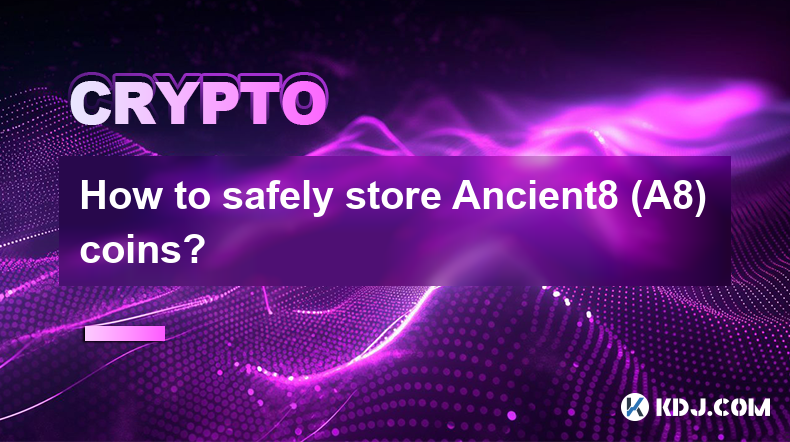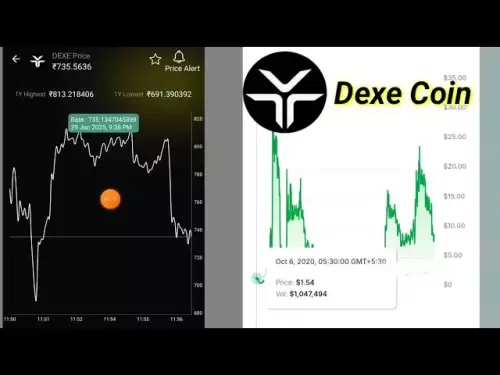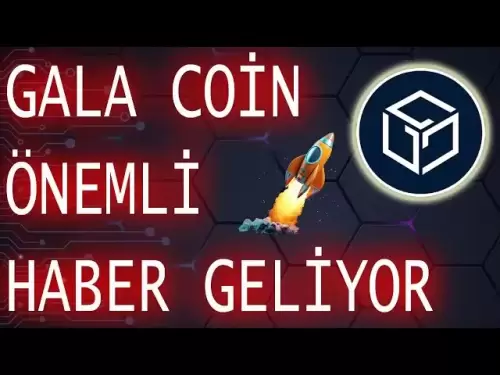-
 Bitcoin
Bitcoin $108,639.5535
1.29% -
 Ethereum
Ethereum $2,507.1944
3.16% -
 Tether USDt
Tether USDt $1.0003
0.00% -
 XRP
XRP $2.1982
0.65% -
 BNB
BNB $654.1814
0.99% -
 Solana
Solana $152.3907
1.88% -
 USDC
USDC $0.9998
-0.01% -
 TRON
TRON $0.2763
0.40% -
 Dogecoin
Dogecoin $0.1683
3.32% -
 Cardano
Cardano $0.5716
1.42% -
 Hyperliquid
Hyperliquid $40.7564
8.17% -
 Bitcoin Cash
Bitcoin Cash $500.5813
1.41% -
 Sui
Sui $2.8642
2.51% -
 Chainlink
Chainlink $13.5555
1.79% -
 UNUS SED LEO
UNUS SED LEO $9.1649
0.51% -
 Avalanche
Avalanche $18.4650
3.41% -
 Stellar
Stellar $0.2386
0.24% -
 Toncoin
Toncoin $2.8878
1.59% -
 Shiba Inu
Shiba Inu $0.0...01168
1.67% -
 Litecoin
Litecoin $87.6955
2.00% -
 Hedera
Hedera $0.1517
3.12% -
 Monero
Monero $312.6714
1.11% -
 Polkadot
Polkadot $3.5008
3.27% -
 Bitget Token
Bitget Token $4.6166
-0.55% -
 Dai
Dai $0.9999
0.00% -
 Ethena USDe
Ethena USDe $1.0002
0.01% -
 Uniswap
Uniswap $7.3109
3.98% -
 Pepe
Pepe $0.0...01008
6.25% -
 Aave
Aave $276.8587
7.04% -
 Pi
Pi $0.5277
-0.95%
How to safely store Ancient8 (A8) coins?
Storing Ancient8 (A8) coins requires a balance between security and convenience, with various options available, including hardware wallets for offline storage, software wallets for versatility, and exchange wallets for ease of trading.
Dec 26, 2024 at 10:39 am

Key Points:
- Understanding the Nature of Ancient8 (A8)
- Exploring Hardware Wallet Storage
- Investigating Software Wallet Options
- Utilizing Exchange Wallets for Convenience
- Considering Offline Storage for Enhanced Security
Comprehensive Guide to Safely Storing Ancient8 (A8) Coins
1. Understanding the Nature of Ancient8 (A8)
Ancient8 (A8) is a utility token that plays a crucial role within the Ancient8 gaming ecosystem. It empowers users to interact with various aspects of the platform, including staking, governance, and purchasing in-game assets. As a valuable digital asset, securing A8 coins is paramount for investors.
2. Exploring Hardware Wallet Storage
Hardware wallets provide a high level of security by storing private keys offline, making them impervious to online hacking attempts. Renowned hardware wallet manufacturers include Ledger and Trezor, offering devices that support A8 storage. Remember, hardware wallets require a physical connection to your computer or device to initiate transactions, ensuring additional protection.
3. Investigating Software Wallet Options
Unlike hardware wallets, software wallets are digital applications that store private keys on your computer or mobile device. While they offer convenience and accessibility, they may be more susceptible to malware or hacking compared to hardware wallets. Some popular software wallets that support A8 include MetaMask and Trust Wallet.
4. Utilizing Exchange Wallets for Convenience
Exchange wallets provided by cryptocurrency exchanges offer a convenient storage method, especially for active traders. However, it is crucial to remember that these wallets are custodial, meaning the exchange holds the private keys and manages your funds. This option is appropriate if you value convenience and plan on frequent trading.
5. Considering Offline Storage for Enhanced Security
Offline storage involves securing A8 coins on a device that is not connected to the internet, such as a USB drive or a hardware wallet stored in a secure location. This method provides the highest level of protection against hacking and online threats but requires a higher degree of technical expertise.
FAQs:
1. What are the advantages of using a hardware wallet?
Hardware wallets offer offline storage, protecting private keys from online hacking attempts. They are highly secure and provide peace of mind for long-term A8 holders.
2. Are software wallets safe for storing A8 coins?
Software wallets can be secure but are more susceptible to hacking compared to hardware wallets. Ensure you use reputable wallets, keep your software up to date, and employ strong security measures to mitigate risks.
3. How do I choose the right storage method for my A8 coins?
The best storage method depends on your individual circumstances. If you value security above all else, a hardware wallet is recommended. For convenience and active trading, an exchange wallet may be suitable. For the highest level of protection, consider offline storage.
4. Is it essential to transfer A8 coins from an exchange to a personal wallet?
If you plan on holding A8 coins for an extended period or value enhanced security, it is advisable to transfer them from an exchange wallet to a personal wallet, such as a hardware or software wallet.
5. What precautions should I take when storing A8 coins?
Always use strong and unique passwords, enable two-factor authentication, and keep your software updated. Additionally, be cautious of phishing attempts and never share your private keys with anyone.
Disclaimer:info@kdj.com
The information provided is not trading advice. kdj.com does not assume any responsibility for any investments made based on the information provided in this article. Cryptocurrencies are highly volatile and it is highly recommended that you invest with caution after thorough research!
If you believe that the content used on this website infringes your copyright, please contact us immediately (info@kdj.com) and we will delete it promptly.
- Blockchain, Apple Stock, and UAE Investors: A New York Minute on Digital Finance
- 2025-06-30 10:30:11
- SEC, Grayscale, and Bitcoin ETFs: A New York Minute on Crypto's Next Big Thing
- 2025-06-30 10:30:11
- Bitcoin, Corporate Restructuring, and Institutional Investors: A New Era?
- 2025-06-30 10:50:12
- SEI User Activity Sparks Short Squeeze Talk as Price Nears Key Resistance
- 2025-06-30 08:30:12
- Toncoin's Traction: Decentralized Payments Stealing the Show?
- 2025-06-30 08:50:12
- ETH, Crypto, and the Validator Upgrade: Wall Street's New Darling?
- 2025-06-30 08:50:12
Related knowledge

How to customize USDT TRC20 mining fees? Flexible adjustment tutorial
Jun 13,2025 at 01:42am
Understanding USDT TRC20 Mining FeesMining fees on the TRON (TRC20) network are essential for processing transactions. Unlike Bitcoin or Ethereum, where miners directly validate transactions, TRON uses a delegated proof-of-stake (DPoS) mechanism. However, users still need to pay bandwidth and energy fees, which are collectively referred to as 'mining fe...

USDT TRC20 transaction is stuck? Solution summary
Jun 14,2025 at 11:15pm
Understanding USDT TRC20 TransactionsWhen users mention that a USDT TRC20 transaction is stuck, they typically refer to a situation where the transfer of Tether (USDT) on the TRON blockchain has not been confirmed for an extended period. This issue may arise due to various reasons such as network congestion, insufficient transaction fees, or wallet-rela...

How to cancel USDT TRC20 unconfirmed transactions? Operation guide
Jun 13,2025 at 11:01pm
Understanding USDT TRC20 Unconfirmed TransactionsWhen dealing with USDT TRC20 transactions, it’s crucial to understand what an unconfirmed transaction means. An unconfirmed transaction is one that has been broadcasted to the blockchain network but hasn’t yet been included in a block. This typically occurs due to low transaction fees or network congestio...

How to check USDT TRC20 balance? Introduction to multiple query methods
Jun 21,2025 at 02:42am
Understanding USDT TRC20 and Its ImportanceUSDT (Tether) is one of the most widely used stablecoins in the cryptocurrency market. It exists on multiple blockchain networks, including TRC20, which operates on the Tron (TRX) network. Checking your USDT TRC20 balance accurately is crucial for users who hold or transact with this asset. Whether you're sendi...

What to do if USDT TRC20 transfers are congested? Speed up trading skills
Jun 13,2025 at 09:56am
Understanding USDT TRC20 Transfer CongestionWhen transferring USDT TRC20, users may occasionally experience delays or congestion. This typically occurs due to network overload on the TRON blockchain, which hosts the TRC20 version of Tether. Unlike the ERC20 variant (which runs on Ethereum), TRC20 transactions are generally faster and cheaper, but during...

The relationship between USDT TRC20 and TRON chain: technical background analysis
Jun 12,2025 at 01:28pm
What is USDT TRC20?USDT TRC20 refers to the Tether (USDT) token issued on the TRON blockchain using the TRC-20 standard. Unlike the more commonly known ERC-20 version of USDT (which runs on Ethereum), the TRC-20 variant leverages the TRON network's infrastructure for faster and cheaper transactions. The emergence of this version came as part of Tether’s...

How to customize USDT TRC20 mining fees? Flexible adjustment tutorial
Jun 13,2025 at 01:42am
Understanding USDT TRC20 Mining FeesMining fees on the TRON (TRC20) network are essential for processing transactions. Unlike Bitcoin or Ethereum, where miners directly validate transactions, TRON uses a delegated proof-of-stake (DPoS) mechanism. However, users still need to pay bandwidth and energy fees, which are collectively referred to as 'mining fe...

USDT TRC20 transaction is stuck? Solution summary
Jun 14,2025 at 11:15pm
Understanding USDT TRC20 TransactionsWhen users mention that a USDT TRC20 transaction is stuck, they typically refer to a situation where the transfer of Tether (USDT) on the TRON blockchain has not been confirmed for an extended period. This issue may arise due to various reasons such as network congestion, insufficient transaction fees, or wallet-rela...

How to cancel USDT TRC20 unconfirmed transactions? Operation guide
Jun 13,2025 at 11:01pm
Understanding USDT TRC20 Unconfirmed TransactionsWhen dealing with USDT TRC20 transactions, it’s crucial to understand what an unconfirmed transaction means. An unconfirmed transaction is one that has been broadcasted to the blockchain network but hasn’t yet been included in a block. This typically occurs due to low transaction fees or network congestio...

How to check USDT TRC20 balance? Introduction to multiple query methods
Jun 21,2025 at 02:42am
Understanding USDT TRC20 and Its ImportanceUSDT (Tether) is one of the most widely used stablecoins in the cryptocurrency market. It exists on multiple blockchain networks, including TRC20, which operates on the Tron (TRX) network. Checking your USDT TRC20 balance accurately is crucial for users who hold or transact with this asset. Whether you're sendi...

What to do if USDT TRC20 transfers are congested? Speed up trading skills
Jun 13,2025 at 09:56am
Understanding USDT TRC20 Transfer CongestionWhen transferring USDT TRC20, users may occasionally experience delays or congestion. This typically occurs due to network overload on the TRON blockchain, which hosts the TRC20 version of Tether. Unlike the ERC20 variant (which runs on Ethereum), TRC20 transactions are generally faster and cheaper, but during...

The relationship between USDT TRC20 and TRON chain: technical background analysis
Jun 12,2025 at 01:28pm
What is USDT TRC20?USDT TRC20 refers to the Tether (USDT) token issued on the TRON blockchain using the TRC-20 standard. Unlike the more commonly known ERC-20 version of USDT (which runs on Ethereum), the TRC-20 variant leverages the TRON network's infrastructure for faster and cheaper transactions. The emergence of this version came as part of Tether’s...
See all articles

























































































